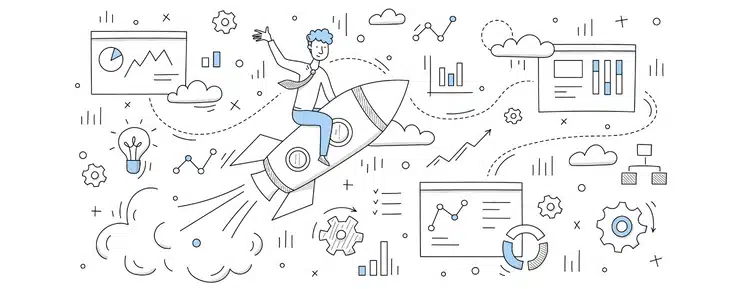How To Become A Data Analyst in 2022: A Comprehensive 8 Step Guide

Introduction to How to Become a Data Analyst
Data Analysis is the process of collecting data from different sources, processing it, and transforming it into reliable information. Data keeps getting accumulated as technology advances. The role of a Data Analyst is required in a wide variety of job sectors such as Research, Retail, Healthcare, Information Technology (IT), and Insurance. The services provided by a Data Analyst contribute significantly to making investment decisions, targeting clients, determining risks, and settling on revenue allocations. In this article let us look into How to Become a Data Analyst.
According to experts in the field, Data Analysts’ jobs are expected to be among the top 10 in 2020. 23% of Data Analytics jobs in India are located in Bengaluru, Mumbai, and Delhi.
There are approximately 93,000+ work opportunities in India in the field of Data Analysis. The domain has a lot of potential and scope, and the demand for skilled Data Analysts is likely to increase in the coming years. In this article, we will cover the following topics:
- Educational Requirements
- What Are The Skills and Basic Qualifications Needed to Become a Data Analyst
- What Does a Data Analyst Do?
- What Is the Typical Role of a Data Analyst?
- What Are Some Common Tools Used In This Field?
- What Are The Possibilities For Career Growth?
- What Is The Job Outlook?
- What Is The Average Salary of a Data Analyst
1) Educational Requirements
How to Become a Data Analyst? The basic qualification required for a Data Analyst role is a Bachelor’s degree, which could be in mathematics, finance, statistics, or computer science. Particular emphasis must be given to developing mathematical and statistical skills. A Master’s in Data Analytics will be an added advantage.
If you are trying to be a Data Analyst without a degree, you can start by completing an online course to understand how to start a Data Analytics career. All of these will answer the question of what you need to learn in order to become a Data Analyst. Try to get an internship at any Data Science company, as that will help you acquire knowledge, expertise, and skills. This will further benefit you in knowing how to become a Big Data Analyst.
In certain cases, internships and employment in the Research & Development area can gradually become full-time jobs if you work hard and show initiative. This helps beginners in making a roadmap on how to become a Data Analyst with no experience and no degree.
2) What Are The Skills And Basic Qualification Needed To Become A Data Analyst
There are several requirements for Data Analytics qualifications, and to start with Data Analytics, you need to learn all of these:
● A Data Analyst must be well-versed in using programming languages, like R, Python, etc., and other tools for data cleaning, statistical analysis, and data visualization. These are important to know how to be a Big Data Analyst.
● Good communication skills are another prerequisite for Data Analysis professionals. Such findings must be relayed to an organization’s decision-making processes.
● Good command of excel is another skill in knowing how to become a Data Analyst in India. Machine learning is an added skill, though not essential for a Data Analyst professional.
3) What Does A Data Analyst Do?
An essential role of a Data Analyst is to collect information from multiple sources and analyze patterns and trends, and so, what is required for a Data Analyst job is usually a sharp skill set to analyze and interpret large sets of data.
Now, let’s answer what a Data Analyst does on an everyday basis. They take a huge amount of data and analyze it to spot patterns, predict and extract information to help decision-makers and leaders make more informed business decisions. Skills in gathering, processing, and conducting statistical analysis on a comprehensive dataset are vital in becoming a Data Analyst. After compilation and analysis are done, the Data Analyst communicates the resulting information in a report.
The Data Analyst’s suggestions and inputs help the organization increase the accuracy and reliability of data structures.
4) What Is the Typical Role Of A Data Analyst?
The role of a Data Analyst is to collect and process data and analyze them to find how they can be used to solve problems.
The input for Data Analysis is usually in numerical or text form. These are collected from different sources, including interviews, downloads, online sources, or other documents provided by the organization’s concerned department. The collected data must then be processed in a structured manner for further analysis using tools like a spreadsheet or other statistical software. These are some of the typical roles and responsibilities of a Data Analyst.
Data Analysts use techniques like graphs and charts to convey information. Knowledge of how to visually represent data will help in Data Analyst career growth.
5) What Are Some Common Tools Used In This Field?
Various tools and software are used by Data Analysts to accomplish their work efficiently. The following are some of the most popular and common tools available to use:
● Excel is one of the most simple, familiar, and universally used tools to perform Data Analysis. It is one of the applications that you will almost always need to use to know how to start with Data Analytics. Excel can be used to evaluate a complex task that may otherwise contain data and is difficult to be visualized or understood by a commoner. With the aid of different tables and graphs, the data can be summarized, thereby enabling it to be organized according to the client’s requirements. Other prerequisites for Data Analytics are tools such as Sas, Tableau, and R.
● To perform Data Analysis efficiently, knowledge of programming languages, like R, is a must. R is the Data Analysis industry’s leading computational instrument, commonly used for statistical and data modelling. It is highly versatile; if there is a command that you want to execute, but a pre-programmed code is missing, you can code it yourself. There’s no end to the opportunities. Knowledge of R can also help to know how to become a freelance Data Analyst.
● Python is another primary programming language used in the field of Data Analysis. It is a simpler language to learn and execute, as compared to R.
● Tableau Public is a free operating system that can integrate all the data required to execute a task. The data source could be based on excel or the web, and the Tableau tool can be used to generate information visualizations and charts.
6) What Are The Possibilities For Career Growth?
Data Mining or Data Analysis are skills that will remain perpetually in demand. For as long as a business exists, they need to analyze why specific systems function and why others do not. In any way, nearly all activities conducted by a brand or organization would have involved the use of data collection. A Data Analyst’s career growth has immense potential if the individual makes an effort to stay updated with new and emerging Data Analysis tools and software.
If you desire to have work stability, career growth, and job efficiency, choosing a career in Data Analytics and attaining Data Analyst qualifications is a wise decision. The field of Data Analysis is ever-evolving, and the graph of a Data Analyst’s career growth is always linear.
7) What Is The Job Outlook?
A Data Analyst’s job outlook is to decipher data and transform it into information that will allow ways to develop a company or business, thereby influencing critical decisions. A Data Analyst’s career growth has immense potential if the individual makes an effort to stay updated with new and emerging Data Analysis tools and software. These upgrades might help perform tasks much more comfortably and efficiently, so an aspirant Data Analyst needs to be adaptable to changes.
8) What Is The Average Salary Of A Data Analyst?
Now that you know the job description and what qualifications you need to be a Data Analyst let us come to the topic of remuneration.
● An entry-level Data Analyst can expect a yearly salary of around INR 3,00,000, while an experienced person (2-3 years of job experience) may receive between INR 4,50,000 and INR 5,00,000 yearly, based on the city and company where they work.
● A mid-career Data Analyst, having 5-9 years of experience, is usually entitled to an average yearly total of INR 6,63,738 – INR 8,00,000.
● A highly experienced individual with 10-19 years of experience can earn an average of INR 8,75,600 per annum. In their late career (20 years and higher), employees may receive salaries as high as INR 1,750,000.
Conclusion
The role of a Data Analyst is indispensable to an organization, and it is an emerging career in our technologically-advancing society, especially in India. Knowledge of becoming a good Data Analyst is being actively pursued because of excessive demand in the work market. Data Analysts have massive compensation and excellent earnings, even at the entry stages and job positions are available in a varied mix of businesses and sectors.
Pairing Data Analyst skill sets with Business and Management skills will prove to be a great asset in the coming years. To solidify Data Analysis & Management concepts, you should check out our Integrated Program In Business Analytics, in collaboration with IIM Indore. This 10-month online live program is easy to understand and designed by highly experienced experts to help learners become Future Leaders and transition into leadership roles.
Also, Read
Role of Data Analyst: All You Need To Know in 3 Important Points













